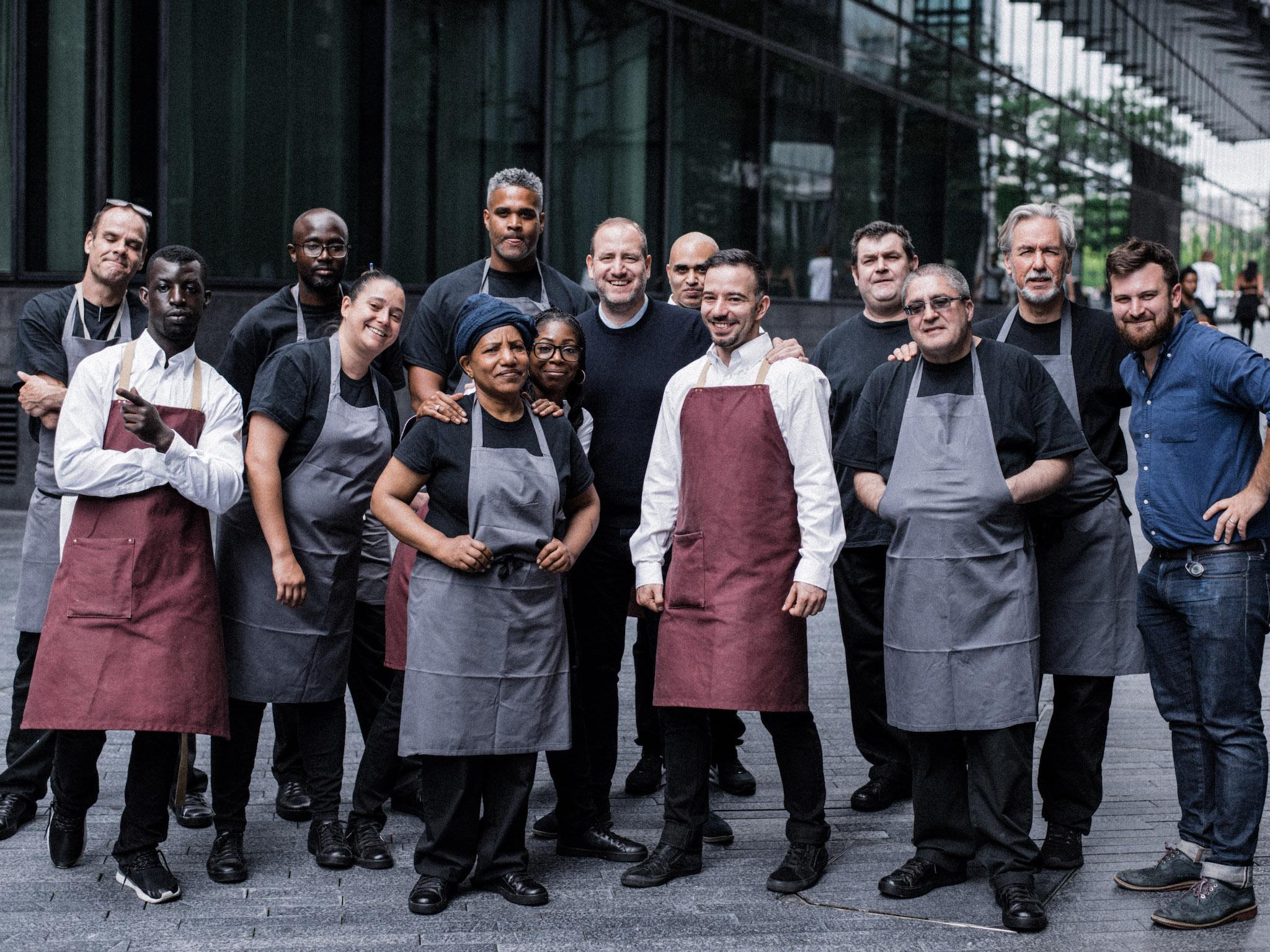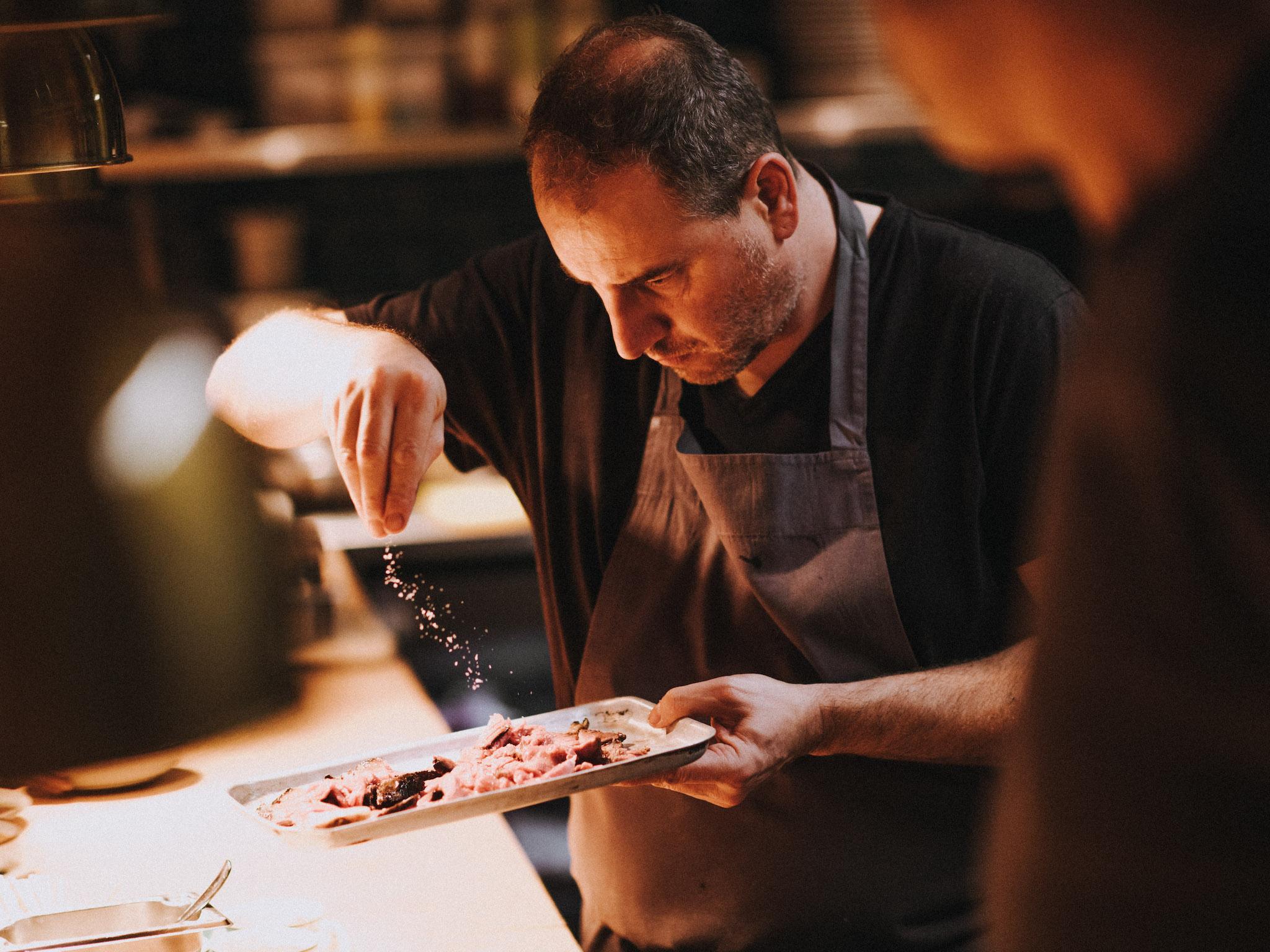Brigade: The restaurant helping vulnerable people find work in the food trade
Using culinary training as a catalyst to motivate and inspire, the social enterprise has worked with thousands of people since 2011 – and has employed over a hundred full-time apprentices at its restaurant in south London, writes Hazel Sheffield

Ben Graveston was being treated for complex post-traumatic stress disorder when he first heard of Brigade, a bar and kitchen with a difference.
He had spent 10 months at the Maudsley, a psychiatric hospital in south London, after a breakdown: a tick bite on a tour of Afghanistan led to a debilitating bacterial infection called Q fever, then a prolonged period of insomnia and depression as he struggled to cope with the end of his career as a combat medic. By the time he left the army, Ben had served in Afghanistan and Iraq, completing five operation tours in the time that someone of his rank would usually be expected to complete one and a half. As his recovery progressed, and he began to contemplate life outside the psychiatric hospital, Graveston worried about how he would adjust to life on his own.
“As a veteran with complex trauma and significant childhood trauma, you can’t get higher on the risk of homelessness,” Graveston says. The British Legion estimated in 2014 that 3 per cent of people sleeping rough in London may be ex-service personnel, while studies have shown that as much as 85 per cent of homeless people in England may have suffered trauma as children.
But Graveston didn’t end up homeless. Instead, an occupational therapist referred him to Brigade, which runs a series of programmes for people who are homeless or at risk of homelessness.
In 2020, Brigade is running its 15th programme, which begins by recruiting between 50 and 100 people with vulnerable backgrounds, from youth services, prison services, drug rehabilitation programmes and, like Graveston, occupational therapists. Brigade’s initial course uses food as a catalyst to motivate and inspire – by cooking new dishes, touring the local market, and learning what it takes to eat nutritious, healthy meals.
Graveston remembers the trip to Borough Market two years ago and how he was unable to switch out of his military mindset. He instinctively started checking the routes in and out, scanning everything, and risk-assessing people going past him.
“Some noises were horrendous,” he remembers. “By that time I had spent 10 months in a mental hospital. I was quite scared of the big, wide world.”
Jan Seymour, an assistant on the programme, fetched Graveston an orange and some rosemary from the kitchen to return him to the present moment when he felt anxious.
“Jan was so sensitive,” Graveston says. “My first day there, I was really struggling with the amount of people around and the fact that I didn’t know them.”
After the initial three-week programme, participants fall into one of three groups: signposted to specific support for their needs, skilled and needing a full-time job, or just starting out in hospitality. People in the third group, such as Graveston, get the opportunity to interview for 16 full-time positions at Brigade, split into eight chefs and eight front-of-house staff. Apprentices leave with an NVQ Level 2 qualification and the work experience they need to find full-time work in the food and hospitality sector.

Simon Boyle founded Brigade in 2011 on the last empty plot of the More London development near London Bridge, which includes City Hall and a large office for the international accounting firm PriceWaterhouseCoopers. PwC, De Vere Ventures and the Homes and Communities Agency came together to invest the £800,000 required to convert the site into the restaurant that now has a turnover of £2m a year, with all profits shared with other charities and social enterprises.
The idea of the venture came much earlier, when Boyle, a former chef, was working as a culinary ambassador for Unilever in 2004.
“My son was three months old and I was running a bath, and watching this water coming out, and thinking about the people I used to work with on ships,” Boyle remembers. He felt compelled to go and help people suffering in Sri Lanka. “It was Boxing Day. My wife said, ‘OK’, not expecting me to [go], but I went two days later. It changed my life.”
Over eight weeks, Boyle helped create a hospital and a classroom for people affected by the tsunami, collecting bandages and reading materials from people passing through.
“You come back and you say, I’m not working on Peperami campaigns any more,” he says. “I got passionate about displacement and how you can lose the thread of life very quickly. A friend helped me to realise that what was happening in Sri Lanka was also happening on my own doorstep.”
With his wife, he set up what would become the Beyond Food Foundation as an events company in 2005, and opened the first iteration of a training kitchen in the House of St Barnabas, a women’s hostel, in Soho in 2006.
Boyle knows first-hand how people – even those with stable lives – start to unravel. He lost his wife after an 18-month illness when she was just 36, in April 2013, leaving him to care for their young son and run the charity they had set up together.
“I see lots of people coming in here who are equally as vulnerable as we were at that time,” he says.
For the first six months following his wife’s death, Boyle didn’t open any post – a job that his wife usually did while he was out working as a chef. The letters piled up until eventually he got in touch with friends and family, who helped him realise that it wasn’t so difficult to open a letter or pay a bill. “But if I had left it any longer, it might not have been so easy to pay those bills, or to keep paying the mortgage or the rent,” Boyle says. “That’s the sort of thing that’s happening to these people – sometimes it’s a small thing and it escalates.”
Brigade has worked with 3,500 people at risk of homelessness and employed 121 full-time apprentices at its restaurant. After training, apprentices leave Brigade for full-time work. Many become loyal members of staff, outstaying others in an industry that is known for its high turnover. Many others drop out long before they get to that point, unable to balance managing their mental health or their personal circumstances and holding down work. Boyle estimates that the project comes into contact with 1,000 people for every 20 employees.
Graveston is one of the successful ones. A year into his employment, he has worked in Mayfair, France and Norway and he has just been promoted. “Food is a safe area for my brain to be in,” he says. “This has literally revolutionised my life.”
Join our commenting forum
Join thought-provoking conversations, follow other Independent readers and see their replies
Comments